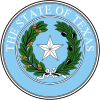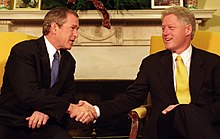
George Herbert Walker Bush was an American politician, diplomat, and businessman who served as the 41st president of the United States from 1989 to 1993. A member of the Republican Party, he also served as the 43rd vice president from 1981 to 1989 under Ronald Reagan and previously in various other federal positions.

The 1992 United States presidential election was the 52nd quadrennial presidential election, held on Tuesday, November 3, 1992. Democratic Governor Bill Clinton of Arkansas defeated incumbent Republican President George H. W. Bush and independent businessman Ross Perot of Texas. The election marked the end of a period of Republican dominance in American presidential politics that began in 1968, and also marked the end of 12 years of Republican rule of the White House, as well as the end of the Greatest Generation's 32-year American rule and the beginning of the baby boomers' 28-year dominance until 2020. It was the last time the incumbent president failed to win a second term until Donald Trump in 2020.

The 1988 United States presidential election was the 51st quadrennial presidential election held on Tuesday, November 8, 1988. In what was the third consecutive landslide election for the Republican Party, their ticket of incumbent Vice President George H. W. Bush and Indiana senator Dan Quayle defeated the Democratic ticket of Massachusetts Governor Michael Dukakis and Texas senator Lloyd Bentsen.
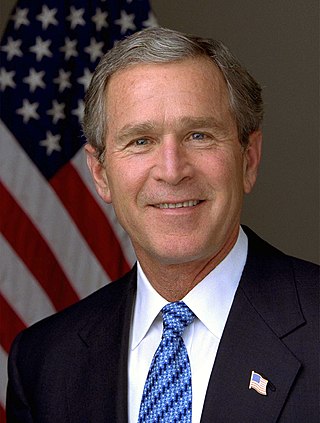
George W. Bush's tenure as the 43rd president of the United States began with his first inauguration on January 20, 2001, and ended on January 20, 2009. Bush, a Republican from Texas, took office following his narrow Electoral College victory over Democratic incumbent vice president Al Gore in the 2000 presidential election, in which he lost the popular vote to Gore by 543,895 votes. Four years later, in the 2004 presidential election, he narrowly defeated Democrat nominee John Kerry, to win re-election. Bush served two terms and was succeeded by Democrat Barack Obama, who won the 2008 presidential election. He is the eldest son of the 41st president, George H. W. Bush.

John Bowden Connally Jr. was an American politician who served as the 39th governor of Texas (1963–1969) and as the 61st United States Secretary of the Treasury (1971–1972). He began his career as a Democrat and later became a Republican in 1973.

The 2000 presidential campaign of George W. Bush, then governor of Texas, was formally launched on June 14, 1999 as Governor Bush, the eldest son of former President George H. W. Bush, announced his intention to seek the Republican Party nomination for the presidency of the United States in the 2000 presidential election.

James Richard Perry is an American politician who served as the 14th United States secretary of energy from 2017 to 2019 in the administration of Donald Trump. He previously served as the 47th governor of Texas from 2000 to 2015 and ran unsuccessfully for the Republican nomination for President of the United States in the 2012 and 2016 elections.

Carole Stewart Keeton, formerly known as Carole Keeton McClellan, Carole Keeton Rylander and Carole Keeton Strayhorn, is an American politician and the former Texas Comptroller of Public Accounts.

George Prescott Bush is an American politician and attorney who served as the commissioner of the Texas General Land Office from 2015 to 2023. A member of the Republican Party, Bush unsuccessfully campaigned for the party's nomination in the 2022 Texas Attorney General election.

Robert Douglas Bullock was an American Democratic politician from Texas, whose career spanned four decades. His service culminated in his term as the 38th Lieutenant Governor of Texas from January 15, 1991, to January 19, 1999, during the term of Governor Ann Richards and the first term of Governor George W. Bush. Bullock is the last Democrat to win and/or hold statewide office in Texas.
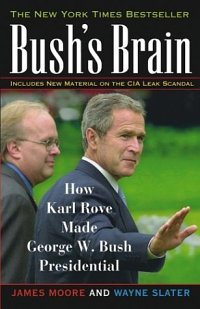
Bush's Brain: How Karl Rove Made George W. Bush Presidential is a book by James Moore and Wayne Slater that chronicles the political career of Karl Rove and the role he has played in the elections of George W. Bush, both when running for Governor of Texas and for president. It was published in 2003 by John Wiley & Sons, Inc. ISBN 0-471-47140-2.

Robert Bryce is an American author and journalist based in Austin, Texas. His articles on energy, politics, and other topics have appeared in numerous publications, including the New York Times,Washington Post,Wall Street Journal,Forbes, Real Clear Energy,Counterpunch, and National Review.

George Walker Bush is an American politician and businessman who served as the 43rd president of the United States from 2001 to 2009. A member of the Republican Party, he served as the 46th governor of Texas, from 1995 to 2000.

The 1998 Texas gubernatorial election was held on November 3, 1998, to elect the governor of Texas. Incumbent Republican Governor George W. Bush was re-elected in a landslide over 4-term Democratic Texas Land Commissioner Garry Mauro, winning 68% of the vote to Mauro's 31%. Bush carried 239 counties, while Mauro carried just 15. Exit polls revealed that Bush won 27% of the African-American vote, which was the highest percentage for any Republican statewide candidate, and 49% of the Latino vote. Bush was sworn in for a second term as Governor on January 19, 1999.

Robert Adam Mosbacher Jr. is an American businessman, founder of BizCorps, and the former head of the Overseas Private Investment Corporation (OPIC). Nominated by U.S. President George W. Bush, Mosbacher was sworn in as the ninth president and chief executive officer of OPIC in October 2005.

John Timothy Griffin is an American lawyer and politician serving as the 57th attorney general of Arkansas. He previously served as the 20th lieutenant governor of Arkansas, from 2015 to 2023. A member of the Republican Party, he previously was the United States Attorney for the Eastern District of Arkansas between 2006 and 2007 and U.S. Representative for Arkansas's 2nd congressional district from 2011 to 2015.
John Weaver is an American political consultant. He worked on the John McCain presidential campaigns of 2000 and 2008. In between, he worked for a time for the Democratic Congressional Campaign Committee. He was also the chief strategist for the 2016 presidential campaign of Republican John Kasich.
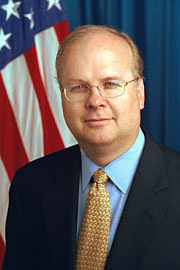
Karl Christian Rove is an American Republican political consultant, policy advisor, and lobbyist. He was Senior Advisor and Deputy Chief of Staff during the George W. Bush administration until his resignation on August 31, 2007. He has also headed the Office of Political Affairs, the Office of Public Liaison, and the White House Office of Strategic Initiatives. Rove was one of the architects of the Iraq War.
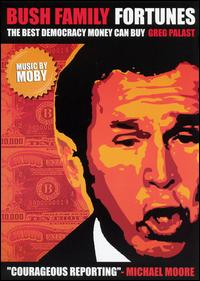
Bush Family Fortunes: The Best Democracy Money Can Buy is a 2004 documentary film directed by Steven Grandison and Greg Palast. The film, which examines various aspects of the presidency of George W. Bush, including the 2000 US presidential election and the Iraq War, is adapted from the 2003 BBC production Bush Family Fortunes and based on the 2002 book The Best Democracy Money Can Buy by investigative journalist Palast, who had spent years tracking the Bush family for the BBC and The Guardian newspaper. The research for the original BBC film, which claims to have exposed the George W. Bush military service controversy, was also drawn upon by Michael Moore for Fahrenheit 9/11 (2004) and footage was used by Robert Greenwald in Unprecedented: The 2000 Presidential Election (2002).
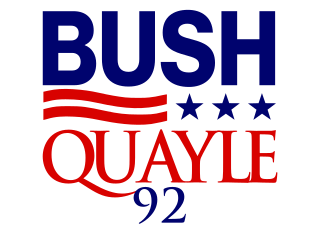
The 1992 presidential campaign of George H. W. Bush was an unsuccessful re-election campaign for 1992 United States presidential election by incumbent president George H. W. Bush, who had taken office on January 20, 1989. Bush and incumbent vice president Dan Quayle were defeated by Democratic presidential nominee Bill Clinton and vice presidential nominee Al Gore. Bush, a Republican president and former vice president under Ronald Reagan, launched his presidential bid on October 11, 1991, and secured nomination for his re-election on August 20, 1992. He was challenged in the Republican primaries by former White House Communications Director Pat Buchanan, who received less than one percent of the delegates in the Republican National Convention.


